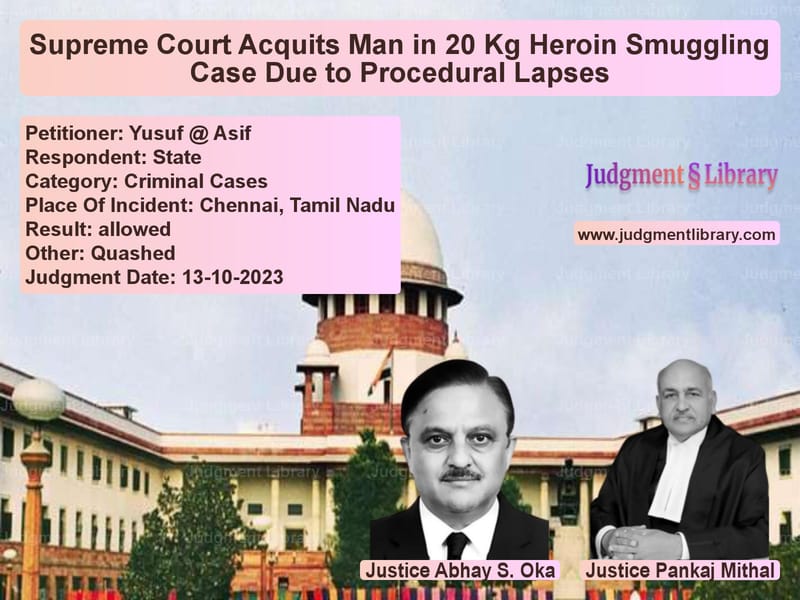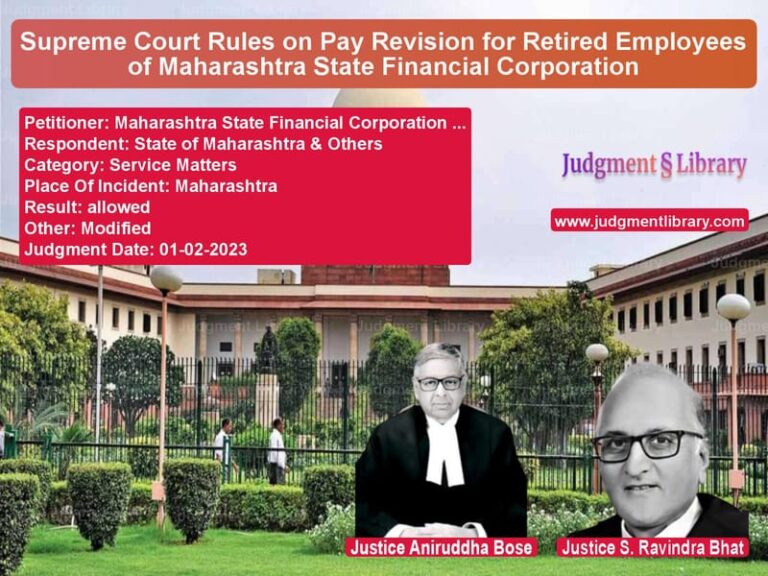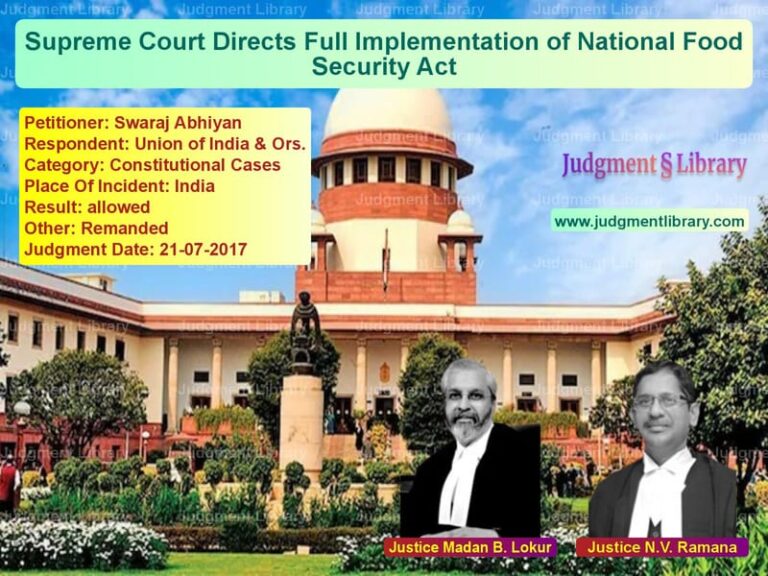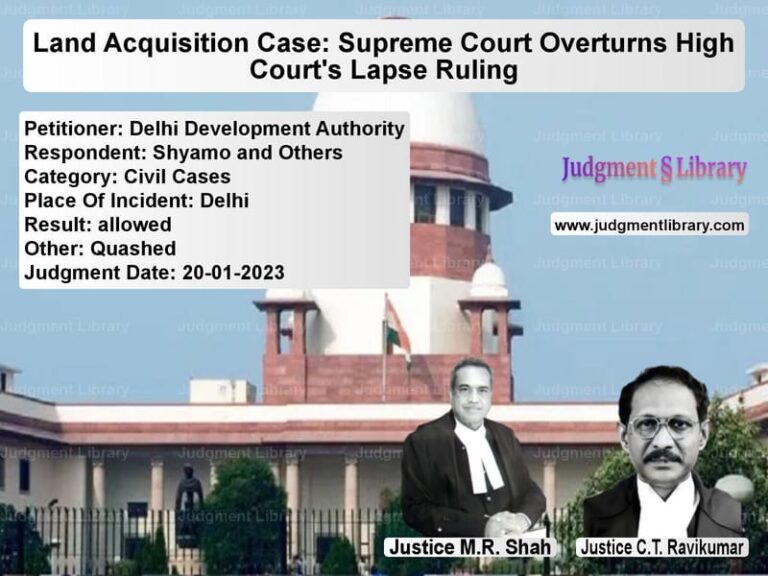Supreme Court Acquits Man in 20 Kg Heroin Smuggling Case Due to Procedural Lapses
The Supreme Court of India recently acquitted the appellant, Yusuf @ Asif, in the case of Yusuf @ Asif vs. State, citing critical procedural lapses in the seizure and sampling of narcotic substances under the Narcotic Drugs and Psychotropic Substances Act, 1985 (NDPS Act). This judgment highlights the significance of strict adherence to legal procedures when handling narcotics cases, ensuring that evidence is properly documented and certified.
Background of the Case
On March 28, 2000, based on intelligence received by the Narcotics Control Bureau (NCB), a lorry parked near Puzhal Central Jail, Chennai, was intercepted. Four individuals, including the appellant, were found inside the vehicle. Upon searching, the authorities discovered 20 kg of heroin concealed in two jute bags. The samples were drawn from 14 large and 12 small polythene packets, which were sealed and seized.
Following the arrest of all four individuals, a case was registered under the NDPS Act, and the trial court convicted them to 10 years of rigorous imprisonment along with a fine of ₹1 lakh each.
High Court Ruling
All four convicts appealed to the High Court. However, during the pendency of the appeal, one of the accused, Ganesh Ram, passed away, leading to the abatement of his appeal. On October 11, 2022, the High Court dismissed the appeal for the remaining accused, upholding their conviction.
Appeal Before the Supreme Court
Aggrieved by the High Court’s decision, the appellant, Yusuf @ Asif, approached the Supreme Court, challenging the conviction on the following grounds:
- Procedural irregularities in the seizure and sampling process
- Non-compliance with Section 52A(2) of the NDPS Act
- Lack of certification from a magistrate
- Discrepancies in the seal number
Petitioner’s (Appellant’s) Arguments
- The appellant contended that the seizure and sampling were done in violation of Section 52A(2) of the NDPS Act, which mandates that the sampling of seized contraband should be conducted before a magistrate.
- The samples were drawn in the presence of a gazetted officer instead of a magistrate, making them inadmissible as primary evidence.
- The inventory and certification of the seized substance were not done as required under the Act.
- There was a discrepancy in the recorded seal number, raising doubts about the integrity of the evidence.
Respondent’s (Prosecution’s) Arguments
- The prosecution contended that the seizure was conducted based on prior intelligence received by the NCB and was executed lawfully.
- After obtaining written consent from the accused, the search was carried out in the presence of a Superintendent of Police, NCB (a gazetted officer).
- The samples were drawn properly and were sealed using NCB Seal No.12, as recorded in the Mahazar (seizure memo).
- The minor discrepancy in the seal number (NCB Seal No.11 was recorded in the godown receipt) was due to a clerical error and did not affect the integrity of the seizure.
Key Observations by the Supreme Court
The Supreme Court analyzed the case primarily based on Section 52A(2), (3), and (4) of the NDPS Act. The Court found serious lapses in the procedure followed by the NCB:
1. Violation of Section 52A of the NDPS Act
The Court ruled that the procedure for drawing samples and certifying seized contraband was not followed as required by law. The judgment explicitly stated:
“In the absence of certification by the magistrate, the samples and inventory cannot be treated as primary evidence.”
2. Lack of Magistrate’s Certification
The NDPS Act requires that an inventory of seized substances and the sampling process must be certified by a magistrate. However, in this case, the prosecution failed to produce any evidence showing compliance with this requirement.
“The prosecution has not brought on record any evidence to prove that the seized contraband was certified by a magistrate.”
3. Discrepancy in Seal Number
The Court noted the discrepancy in the seal number recorded in different documents:
- Seizure memo and investigation documents: NCB Seal No.12
- Godown receipt: NCB Seal No.11
Even though the prosecution termed this a clerical mistake, the Court found that such discrepancies create serious doubts about the integrity of the evidence.
4. Failure to Follow Established Legal Precedents
The Court cited its previous ruling in Union of India vs. Mohanlal (2016), which mandates that:
“Seized narcotic substances must be certified by a magistrate, and failure to do so renders the seizure and sampling unreliable.”
Final Judgment
Based on these findings, the Supreme Court:
- Set aside the conviction of Yusuf @ Asif.
- Held that the failure to comply with Section 52A(2) of the NDPS Act vitiated the trial.
- Ordered that the appellant be acquitted of all charges and his bail bonds be canceled.
Implications of the Judgment
This ruling has significant legal implications:
- Strict Compliance with NDPS Act: Law enforcement agencies must strictly follow procedural safeguards under the NDPS Act, ensuring sampling and certification by a magistrate.
- Impact on Future NDPS Cases: Any procedural lapse in narcotics cases can result in acquittals, emphasizing the importance of legal compliance.
- Ensuring Evidentiary Integrity: The ruling underscores that discrepancies in seal numbers and the absence of proper documentation can render seizures invalid.
Conclusion
The Supreme Court’s judgment in Yusuf @ Asif vs. State sets a precedent in narcotics law enforcement by reinforcing procedural safeguards. The case highlights that even in serious drug-related offenses, adherence to legal mandates is paramount. The ruling serves as a reminder to investigative agencies that failure to follow due process can lead to acquittals, no matter how strong the underlying allegations may be.
Petitioner Name: Yusuf @ Asif.Respondent Name: State.Judgment By: Justice Abhay S. Oka, Justice Pankaj Mithal.Place Of Incident: Chennai, Tamil Nadu.Judgment Date: 13-10-2023.
Don’t miss out on the full details! Download the complete judgment in PDF format below and gain valuable insights instantly!
Download Judgment: yusuf-@-asif-vs-state-supreme-court-of-india-judgment-dated-13-10-2023.pdf
Directly Download Judgment: Directly download this Judgment
See all petitions in Drug Possession Cases
See all petitions in Custodial Deaths and Police Misconduct
See all petitions in Judgment by Abhay S. Oka
See all petitions in Judgment by Pankaj Mithal
See all petitions in allowed
See all petitions in Quashed
See all petitions in supreme court of India judgments October 2023
See all petitions in 2023 judgments
See all posts in Criminal Cases Category
See all allowed petitions in Criminal Cases Category
See all Dismissed petitions in Criminal Cases Category
See all partially allowed petitions in Criminal Cases Category







